
IN PARTNERSHIP WITH

Good morning ☀️
Twitter is working on an update for Spaces that will allow streamers share clips from recorded Spaces.
Presently, the update is only available for select iOS users but it’ll eventually be available to everyone.
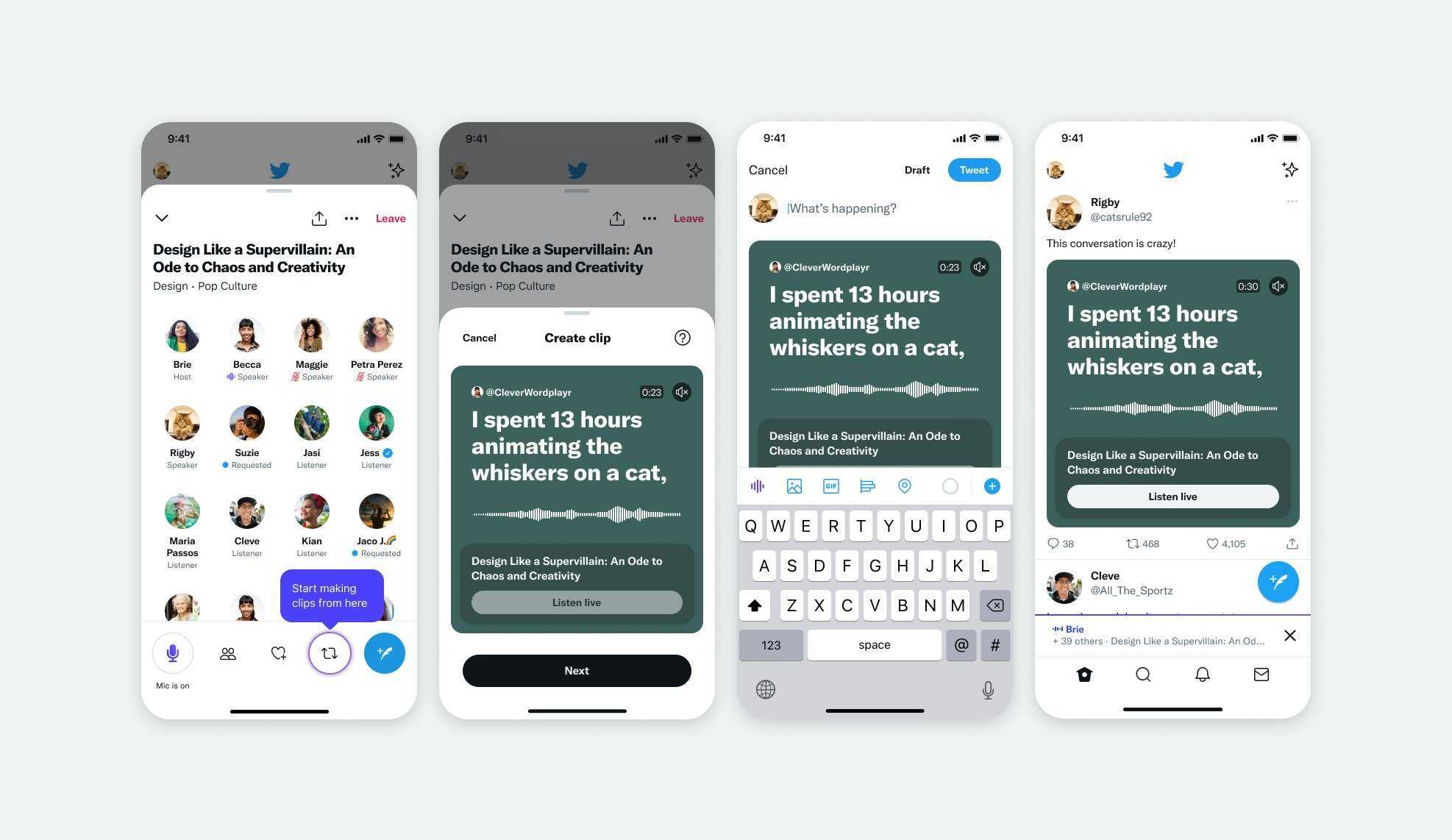
In today’s edition
- Google Africa’s first internet cable will arrive in Togo
- The Nigerians escaping Ukraine’s war
- Facebook’s phishing test
- TC Insights: More women in tech
- Event: IoTFA2022
- Job opportunities
GOOGLE AFRICA’S FIRST INTERNET CABLE WILL ARRIVE IN TOGO
Google has announced that Equiano, a subsea internet cable running through Portugal to South Africa, will first land in Togo. Equiano is expected to land in South Africa, Namibia, Nigeria and St Helena later in the year, connecting the continent with Europe.
Side-bar: Subsea internet cables are exactly what they sound like. Originally called submarine communications cables, they are thick wires laid on sea-beds, over great distances and they’re responsible for transmitting data. In fact, 99% of the data transmitted on the internet is possible through these cables. It’s how we can binge YouTube videos, or even attend those incredibly long Zoom meetings.
Globally, there are over 400 of these cables. In Africa, of the 38 countries with direct access to the open sea, 37 have at least 1 cable landing. 11 of these countries have only 1 subsea cable, 10 countries have 2 subsea cables, 6 have 3 subsea cables, and 10 have more than 3.
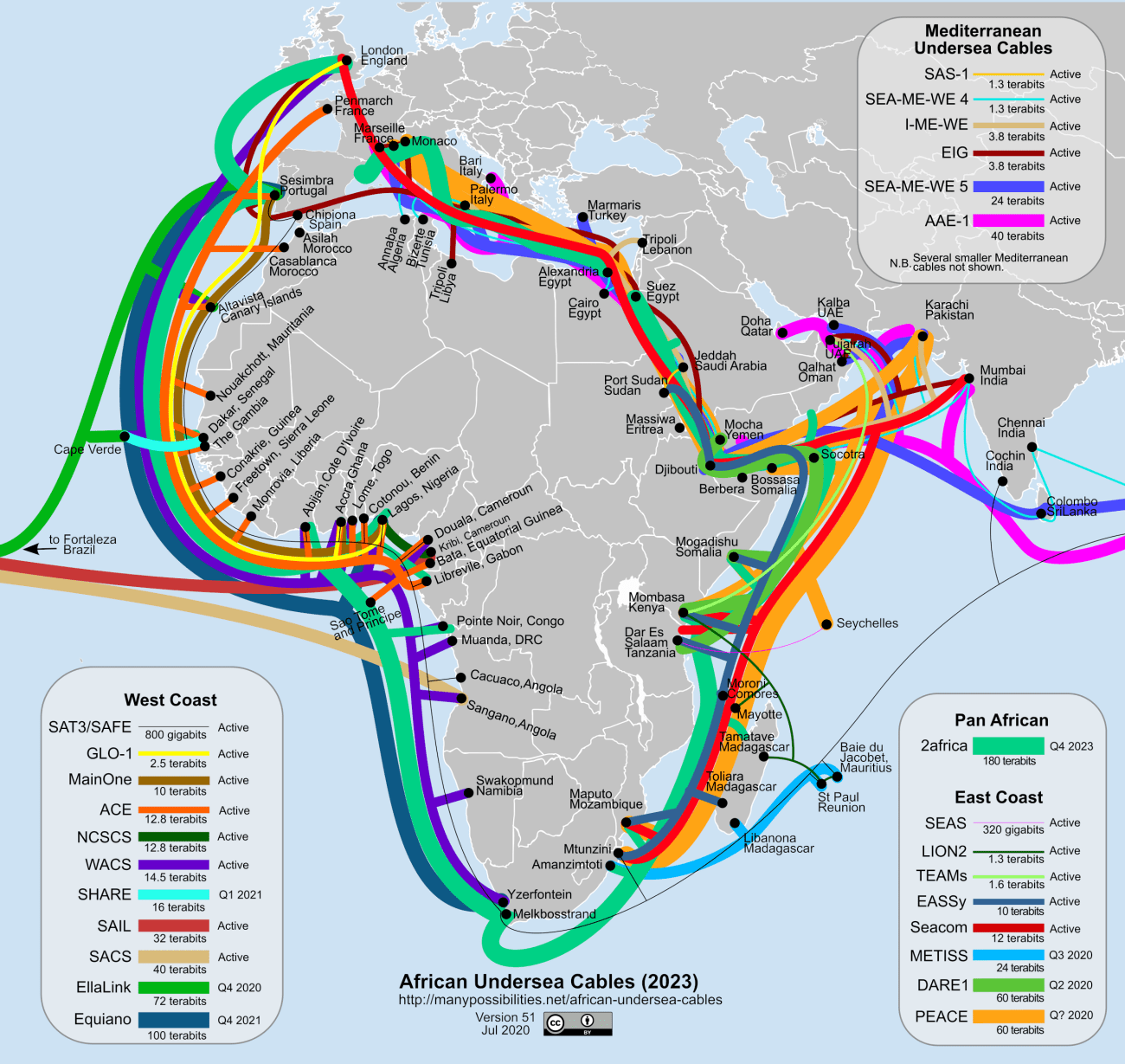
Project Equiano marks a milestone in Google’s plan to provide affordable internet access in Africa by building global infrastructure to help bring faster internet to more people and lower connectivity costs. It’s also part of Google’s plan to invest $1billion over 5 years to support digital transformation in Africa.
According to an economic impact assessment of Equiano in Togo from Africa Practice and Genesis Analytics, it is estimated that the subsea cable will add approximately 37,000 new jobs between 2022 and 2025, and increase Togo’s economic output by an additional USD 351 million during the same period.
Don’t just send money, send money fast. Send and receive money directly to mobile wallets, bank accounts, Barter or through cash pickup with $end.
Visit send.flutterwave.com and do it now!
This is partner content.
THE NIGERIANS ESCAPING UKRAINE’S WAR

The Russo-Ukrainian war is entering its fourth week.
Since Russian forces invaded Ukraine on February 24, over 6.5 million Ukrainians have been displaced, and 800+ civilians killed.
Of the millions displaced, African immigrants make a notable percentage. In fact, African students make up 20% of Ukraine’s 76,000 international student population.
At the onset of the war, martial law was instituted and commercial flights out of Ukraine were grounded. This means anyone who wants to escape the crisis has to use other means—rail, road, and trail.
For many Africans, their journey has been marked with difficulty, from unresponsive government agencies to racism.
Medical student Kemi, for example, experienced a journey that took over 3 days. Running from her apartment in Kyiv where the curtains rattled as bombs fell, Kemi and her friends spent hours forcing themselves into trains where they stood for 7 hours. “It was either that or pay $1,600 for a cab trip that normally costs $50,” she says.
Akam, a Nigerian aerospace engineer, didn’t find it any easier. His journey from Ukraine to Slovakia involved a 12-hour walk, leaving behind his flourishing career and anything he couldn’t carry in a backpack.
For Fortune, a graduate living in Ternopil, the war wasn’t cause for alarm. Having some experience with the Russo-Ukrainian war from 2014 when his brother escaped Ukraine, Fortune’s journey involved patience and biding his time for weeks until he could leave Ukraine for Hungary.
In the relaunch of our flagship, Digital Nomads, we explore the lives of 3 Nigerians who escaped Ukraine’s war.
Buy Dollar stablecoins with Naira on Busha, Earn passive income on your Dollar stablecoins, Receive interest daily and cash out anytime you want. With Busha, you get access to the best flex savings for Dollar equivalent in Nigeria. Start saving for the future you want NOW!
This is partner content.
FACEBOOK’S PHISHING TEST
We’ve discussed what phishing emails/scams are. It’s where scammers try to gather personal information by sending deceptive e-mails to target recipients.
For example, here’s a supposed email from Facebook Support TechCabal got a while back:
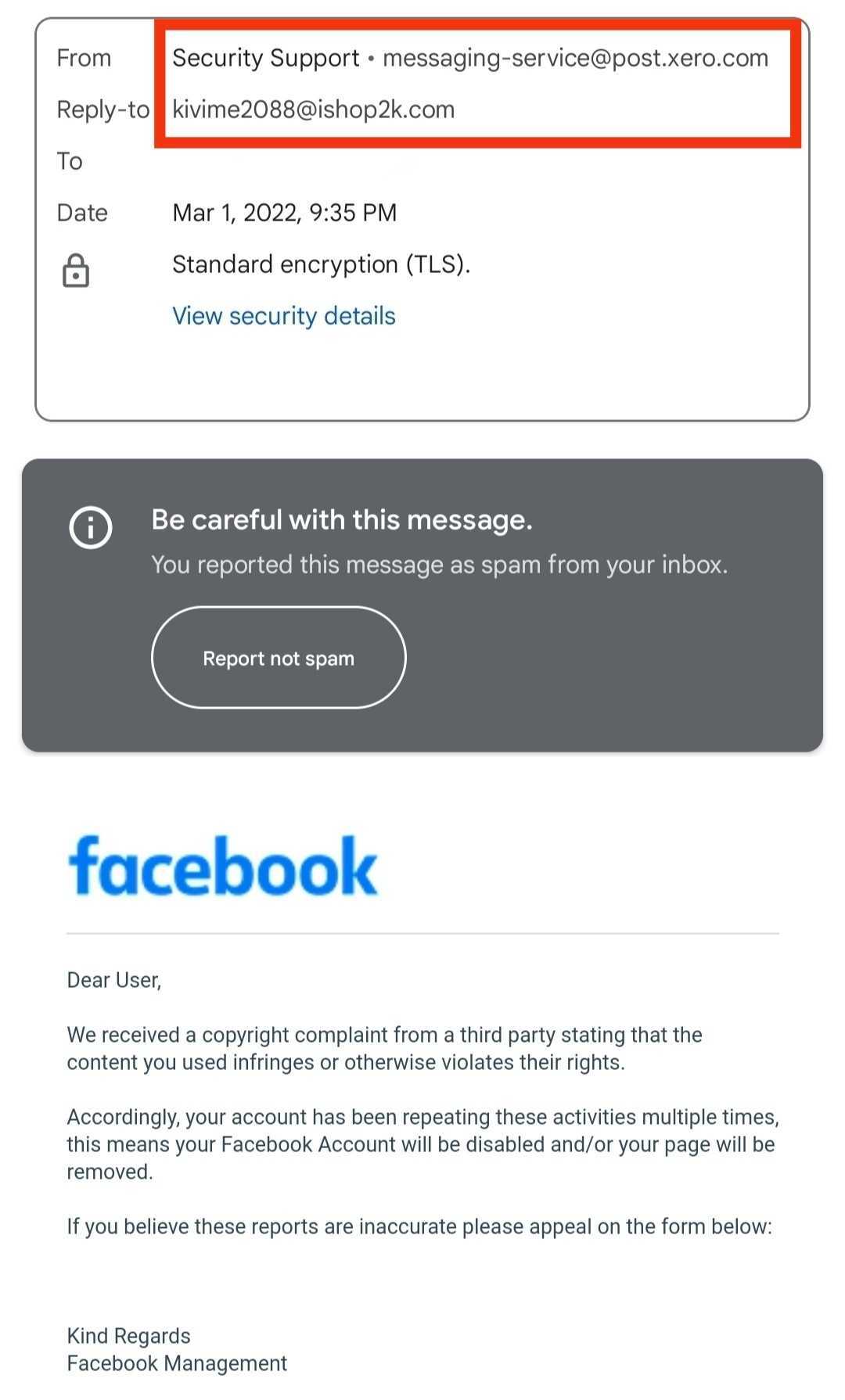
Notice the originating sender? And the Reply-to address? They’re not the typical email addresses corporate companies like Facebook or Google use. And anyone who’s been on the internet long enough knows this.
But here’s the thing, that knowledge may have gotten some users locked out of their Facebook accounts.
What’s up?
Facebook conducted a phishing test this month.
Earlier in March, some users got a spam-like email from “security@facebookmail.com” telling them to turn on the Facebook Protect feature by hitting a link. The email also said that if they didn’t turn it on, they’d be locked out of their account.
Side-bar: Facebook Protect is a feature that offers individuals whose accounts are often targeted like journalists or government officials, different ways to secure their accounts including setting up two-factor authentication.
The problem is that the outline of Facebook’s email to its users is similar to how phishing emails are outlined. Compare this one [below] to the one we received above. The originating email had a different domain name from the usual “@facebook.com” most people were used to.
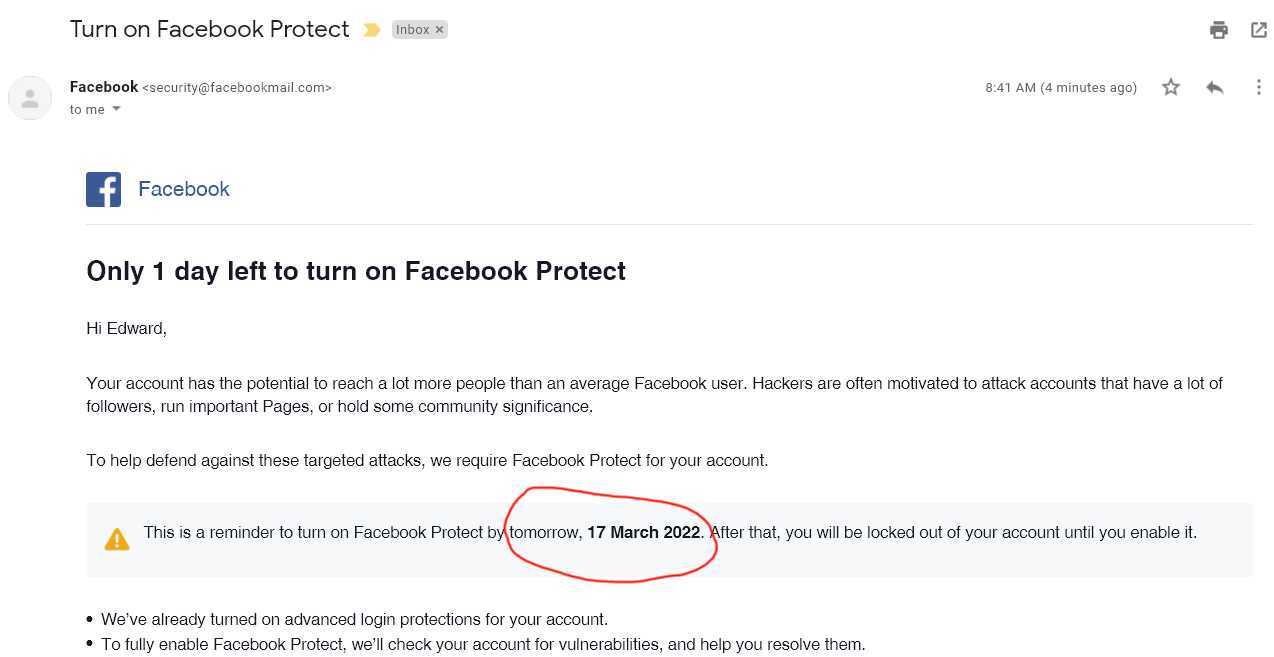
So most people ignored Facebook’s email to turn on Facebook Protect but the email turned out to be real and now, people who didn’t turn on Facebook Protect [and some people who did] are locked out of their accounts because they failed to respond to the scam-like email.
Will they be able to recover it?
Facebook says they will but so far, its recovery process has been buggy.
According to The Verge, recovery options for most people aren’t working. Facebook hasn’t responded to these complaints yet.
Zoom out: Most emails from Facebook these days are from the domain name “@facebookmail.com” including “notifications@facebookmail.com” for notifications and “reminders@facebookmail.com” for reminders. If you want to check which Facebook emails are real or spam, you can check your Facebook account to see the recent emails Facebook has sent to you.
Fincra provides reliable payments solutions for fintechs, online platforms and global businesses. Their solutions make it super easy for businesses to send and receive local and international payments in EUR, GBP and NGN from/to customers, suppliers and partners seamlessly without the headaches associated with traditional payment methods. You can gain access to Fincra’s platform through a merchant portal or simply integrate their payment API keys into your platform.
Sign up for a quick demo in less than 5 minutes here.
This is partner content.
TC INSIGHTS: MORE WOMEN IN TECH
Sub-Saharan Africa has a female labour-force participation rate of 61%, with women constituting only 30% of professionals in the continent’s tech industry. A higher figure compared to Europe’s 27% but lower than South East Asia’s 32%.
As technology continues to dominate the future of work, it is important that women play a more active role.
To promote more female participation in tech, various initiatives have been led by organisations such as ShecodesAfrica, TechHer, and WomeninTech to help women gain tech skills.
While those steps are laudable and critical to reducing the imbalance, the root of the matter needs to be tackled. The male-centric images of the tech industry as well as the broader bias against women in tech make it unappealing to many young women. For most female students of STEM-related disciplines, being the minority gender in a male-dominated class buttresses this.

According to Dr Florence Oladeji, a senior lecturer of the Department of Computer Science of the University of Lagos (Unilag), in a class of 100 students in the department, there are usually only between 10 to 17 female students.
To solve this, learning resources that portray females in STEM should be encouraged. This helps with de-biasing tech-related careers as a boys-only club. Particularly, within the formative years when behaviour can be modelled easily.
According to Ommo Clark, the Chief Executive Officer of iBez Nigeria, “Right from the homes, girls should be encouraged to see technology as something that’s for everyone and not just for boys or people with special powers.”
For instance, high-flying female professionals in tech should connect more with younger women to mentor and influence them. This way, the thought of pursuing a tech-related career becomes less daunting.
Getting girls and women into STEM is important, as most of them will make up the pipeline of Africa’s female tech professionals in the future. This will improve innovation, and add an enriching perspective for the next set of tech products to be built for Africans.
You can download all our reports here and watch videos from our events. Send your custom research requests here.
EVENT: IOTFA2022

Africa’s premier Internet of Things event, the #IoTFA2022, is set to be held on 29 and 30 March 2022 at the Maslow Hotel in Johannesburg, South Africa.
The event will feature an exciting list of visionaries, thought leaders, and industry experts who will explore the benefits and challenges of IoT in key industries.
The hybrid event will also offer Africa’s biggest IoT players a platform to showcase some of the latest IoT solutions to a diverse audience drawn from the public and private sectors.
You can participate as a speaker, as an attendee or even join the event as an exhibitor.
Find out more about #IoTFA2022 here.
JOB OPPORTUNITIES
- Big Cabal Media – Data Analyst Intern (Events), Data Analyst Intern (Research and Reports) – Nigeria (Remote)
- TM Labs – Product Design Intern, Product Marketer – Abuja, Nigeria
- Foondamate – User Success Agent – Nigeria (Remote)
- Ouida Books – Digital Community Manager – Lagos, Nigeria
Find more opportunities here and submit your listings to bit.ly/tcxjobs.
What else we’re reading
- Telegram is now banned in Brazil, and it’s all because they forgot to check their emails.
- Nigeria’s Securities and Exchange Commission has shut down 3 companies for illegal activities in the capital market.
- UBA & Cellulant are joining forces to unite Africa’s payments ecosystem.
- How robot dogs can change criminal investigation and mining in South Africa.
DON’T JUST READ THE BRAND, WEAR IT TOO
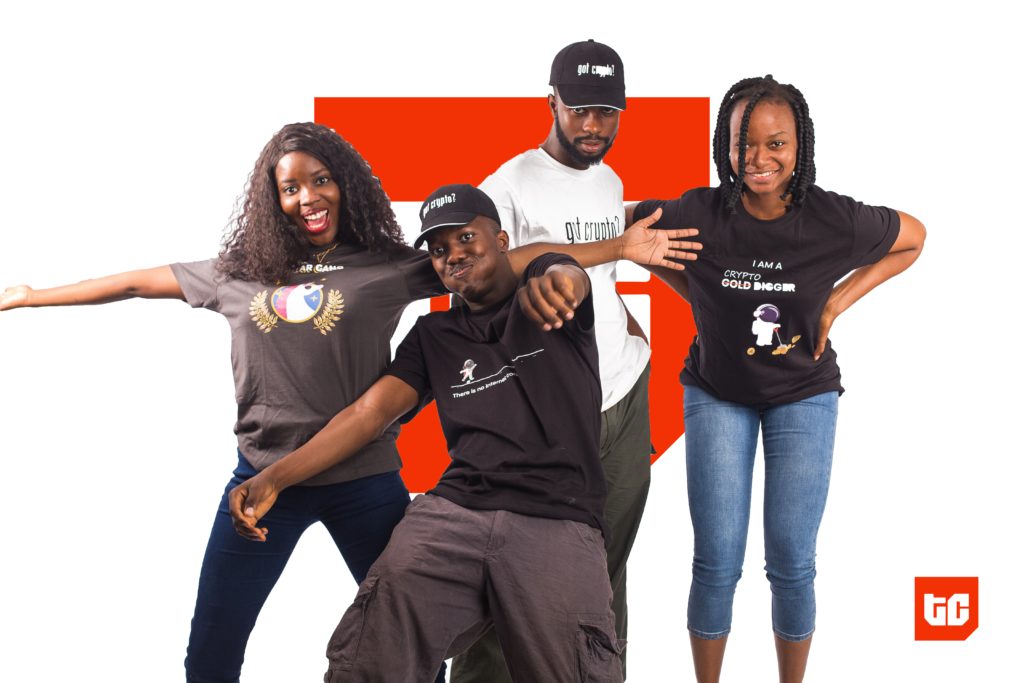
Visit techcabal.com/shop and associate yourself with greatness.

























